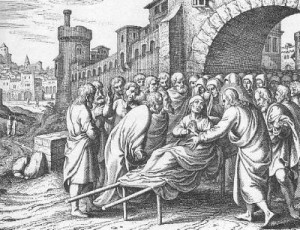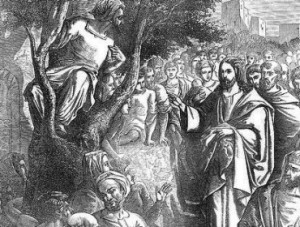====================
This sermon was preached on the Seventh Sunday after Pentecost, July 7, 2013, at St. Paul’s Episcopal Church, Medina, Ohio, where Fr. Funston is rector. The worship that morning included breaking ground on an expansion of the church’s parish hall.
The lessons were taken partially from the readings suggested in the rubrics of The Book of Occasional Services for a ground breaking liturgy and partially from the Revised Common Lectionary for Pentecost 7 (Proper 9, Year C). The Old Testament reading was Genesis 28:10-17; the Gradual was Psalm 132:1-9. The epistle was Galatians 6:1-16; the gospel lesson was Luke 10:1-11,16-20. The latter two lessons can be read at The Lectionary Page.
====================
 What is a church building? It’s a holy place. It’s a place where people gather to worship. It’s a place where people encounter God. It’s a place where God’s people enjoy one another’s company. It’s a place where people get married, where babies are baptized, where funerals are held, where memories are made and lives remembered. It’s a place where the stories of faith are told and retold. It’s a place we teach and it’s a place where we learn.
What is a church building? It’s a holy place. It’s a place where people gather to worship. It’s a place where people encounter God. It’s a place where God’s people enjoy one another’s company. It’s a place where people get married, where babies are baptized, where funerals are held, where memories are made and lives remembered. It’s a place where the stories of faith are told and retold. It’s a place we teach and it’s a place where we learn.
Our reading from Genesis this morning is a small part of the story of Jacob, the son of Isaac who will later be called “Israel.” Jacob is the least likely of patriarchs. Of all the biblical patriarchs, he is the most enigmatic. He never exhibits either the awesome faith of Abraham or the level-headedness of Isaac. He is, in fact, a scoundrel. He’s tricked his father and cheated his brother out of the blessing of the first-born; his character emerges through a series of deceptions, intrigues, and conflicts. He will wrestle with God and be given the name “Israel,” the name that will identify his descendants for the rest of time. He must be taught by God; he has some learning to do.
In the story we heard today, he is on the run. He is afraid of his brother, whom he has cheated, so he has taken off. His father has told him to flee to Haran (his grandfather Abraham’s original home) and there find a wife. Along the way, he camps near a town called Luz and has this dream that we have all heard of before, the vision of a ladder on which angels are traveling back and forth between heaven and Earth. He learns that, like Moses before him, he is standing on holy ground. He says, “How awesome is this place! This is none other than the house of God, and this is the gate of heaven,” and so he renames it, Bethel, “House of God.” A lot of sermons have been preached about Jacob and his character flaws, or about this vision and what the angels coming and going might mean.
But, today, what I want to call to our attention is what God says to Jacob: “Your offspring [God says] shall be like the dust of the earth, and you shall spread abroad to the west and to the east and to the north and to the south; and all the families of the earth shall be blessed in you and in your offspring.”
The descendants of Jacob would go forth from that place to spread blessing to all the corners of the earth – to west, to east, to north, to south. They would go out from that place to change the world.
I’m particularly fond of an Orthodox Jewish translation of this text: “Your seed shall be as the dust of the earth; and you shall burst forth to the west, and to the east, and to the north, and to the south; and in you and in your seed shall all the families of the earth be blessed.” I love that image – Jacob and his descendants would not, could not stay in that awesome place; they could not stay in the house of God or at the gate of heaven. They had to leave, to spread from the Holy Land, to “burst forth” bringing a transformation to the world that would be explosive and dramatic.
We are not gathered in a desert wilderness. We have not gone to sleep on holy stones. We have not seen angels climbing to rocks to heaven . . . but we have gathered in a church building, a place that for many for generations has been an awesome place, a house of God, and a gate of heaven, a place where children have been blessed, where children have been told the stories of God, the stories of Jesus, where hymns of joy have been sung. We are gathered in this place to reaffirm our commitment that heritage and that ministry, to renew this place and to renew the ministry done here.
But like Bethel where Jacob camped for the night, this is not a place to stay; it is a place to leave. It’s a place from which the people of God are sent into the world.
Church buildings are centers of ministry, places of assembly, where God’s people gather to worship, to hear the good news, and to be transformed, not for themselves but in order to be sent back out into the world, to “burst forth” and change the world. Jesus’ last words to his followers were, “Go . . . and make disciples!” (Matt. 28:19)
In our gospel lesson today, Jesus gives his followers their marching orders. “The Lord appointed seventy [followers] and sent them on ahead of him in pairs to every town and place where he himself intended to go.” Some commentators suggest that seventy disciples were chosen because in rabbinic tradition, seventy represents the total number of nations in the world. Just as the children of Jacob were to spread to every corner of the earth, the disciples of Jesus are to go to every nation in the world. As the descendants of Israel are to be a blessing to others, the disciples of Jesus are to go into the world and announce that “the kingdom of God has come near.”
Church buildings, worship spaces and fellowship halls, are the bases from which the church is sent out to do that, as the disciples in today’s reading from Luke were sent out by Jesus. The Rev. Edward Markquart, pastor of Grace Lutheran Church in Seattle, Washington, writes this about our gospel lesson today:
What happened is that those disciples first went to a village or town. Those first disciples planted a church, and then went to a second village or town, and planted a church. They went to a third village or town and planted another church. They … whoops. We have to go back to that first village or town and look more carefully. We have to go back to that first village, because before the disciples went onto the second village, they left a group of people in that village who were committed to Jesus Christ. The Greek word is “laos.” They were called the “laos,” which means, “the laity,” “the people,” “the people of God.” The Apostles always left common and ordinary townspeople and villagers whose hearts were on fire, whose tongues were on fire, who hadn’t gone to the seminary, who hadn’t seen Jesus face to face, who hadn’t talked with him in the flesh. These were not the Apostles. These were not the twelve disciples. These were the people of God in each village who spread the Gospel from house to house, and neighbor to neighbor and friend to friend and family to family. That’s the way it always is. That fundamental principle is always true; it is the laity, the people of God, who become inspired by the Holy Spirit. They are the ones, not the twelve, not the Apostles, not the pastors. It is the laity, the people of God, who go about winning souls to Jesus Christ and nurturing those souls into maturity. (Sermons from Seattle)
Church buildings don’t change the world. They may be awesome; they may be houses of God; they may be gates of heaven. But by themselves, they don’t win people to Jesus, nurture souls to maturity, or change the world. Church buildings are meant to be the bases from which the people of God do that. Church buildings are meant to be places of life, living, breathing, growing, exciting places of life. Church buildings are meant to be centers of ministry, places of assembly, where God’s people gather to worship, to hear the good news, to celebrate the meaning of life, and to be transformed, and then “burst forth,” back out into the world to share that life and transform the lives of others.
We have broken ground today on our Inviting the Future project; after four years of visioning and planning, we have, at last, begun this project to improve this center of ministry, not as a monument to ourselves, but as a place from which we might better serve the world, that we might “burst forth” and tell the world that the kingdom of God is at hand.
Poet and priest Sheila Nelson-McJilton, offers a poetic retelling of our Old Testament reading in her poem Who Sleep on Holy Stones: A Meditation on Genesis 28:10-17.
Bearer of curse and blessing,
I left home to stumble into the desert,
Exhausted and empty
I watch fierce sun set over silent stones.
Stars ascend toward midnight,
The wind moans through desert canyons,
And clouds drift across a full moon like shimmering angels.
Broken and empty I come to you, O Lord God.
In a desert midnight,
There is no smell of blessed fields
No grain
No wine
No fatness of earth
No sweet dew of heaven.
Alone I sleep on holy stones,
Under stars that blaze fierce and countless as dust.
The wind moans high above me, through desert canyons.
Clouds veil the moon.
Strong shining faces of angels appear.
Michael Gabriel Raphael
Lean down to earth.
Their glittering swords carve stones into steps to heaven.
Angels descend in silence to gaze into my face.
Angels ascend in silence to bear my deceit away.
Then in a shimmering celestial dance
Of turning wings,
Swirling wings
They sweep aside clouds.
I see a heavenly host as countless as dust.
I hear a heavenly host, their voices joined by joyous stars.
Glory to God in the highest,
And on earth . . . peace.
Their alleluias echoing high above desert canyons,
The Holy One descends from the gate of heaven
To stand beside my stone pillow.
To wrap my empty fears
In an eternal mantle of blessing.
To hallow the ground on which I sleep.
Michael veils the moon with his wings
And the only light I see is God.
I left home, soul that raged with wild emptiness
And in this desert wilderness, angels carve holy names for sleep.
They dance a path between me and You, O Lord God.
You have found me, broken and empty,
On holy stones that ascend to the very gates of heaven,
And you have not cursed me.
In a desert midnight, I know the smell of blessed fields, grain.
I will tell of you, O Lord God,
To laughing children who bless my tent,
To strong children who become tribes as countless as dust.
I will tell them of desert midnights filled with blazing stars
Of fierce angels who carve holy stones
And dance with glittering swords among clouds
Of hymns sung by joyous stars over Bethel
And over Bethlehem.
(from Anglican Theological Review, Winter, 2000)
What is a church building? A church building is a place to leave. From this place, this improved place, this living, breathing and growing place, we will leave. We will “burst forth” to tell in story and in song, in words and in deeds, in actions and in ministries, of the love of God. We will tell of God to laughing children, to strong children, to hungry children, to mourning children, to children in need, to all of God’s children; we will tell them of desert midnights and blazing stars; we will tell them that the kingdom of God has come near!
As we do so, let us never forget the prayer which has guided us throughout this project, a prayer written by Archbishop Desmond Tutu adapted from an original by Sir Francis Drake.
Let us pray:
Disturb us, O Lord
when we are too well-pleased with ourselves
when our dreams have come true because we dreamed too little,
because we sailed too close to the shore.
Disturb us, O Lord
when with the abundance of things we possess,
we have lost our thirst for the water of life
when, having fallen in love with time,
we have ceased to dream of eternity
and in our efforts to build a new earth,
we have allowed our vision of Heaven to grow dim.
Stir us, O Lord
to dare more boldly, to venture into wider seas
where storms show Thy mastery,
where losing sight of land, we shall find the stars.
In the name of Him who pushed back the horizons of our hopes
and invited the brave to follow,
our Lord Jesus Christ. Amen.
====================
A request to my readers: I’m trying to build the readership of this blog and I’d very much appreciate your help in doing so. If you find something here that is of value, please share it with others. If you are on Facebook, “like” the posts on your page so others can see them. If you are following me on Twitter, please “retweet” the notices of these meditations. If you have a blog of your own, please include mine in your links (a favor I will gladly reciprocate). Many thanks!
====================
Father Funston is the rector of St. Paul’s Episcopal Church, Medina, Ohio.
 At the beginning of the sermon, following the reading of Gospel lesson, five readers scattered among the congregation, rose and loudly read the following five passages simultaneously:
At the beginning of the sermon, following the reading of Gospel lesson, five readers scattered among the congregation, rose and loudly read the following five passages simultaneously:
 You may remember that last week, as we were looking at the story of Elijah competing with the prophets of Ba’al, I said that Elijah was an unpleasant person. Well, this week we have another story of Elijah and another example of his unpleasantness. The Rev. Lia Scholl, a Mennonite pastor who writes sermon helps on a blog called
You may remember that last week, as we were looking at the story of Elijah competing with the prophets of Ba’al, I said that Elijah was an unpleasant person. Well, this week we have another story of Elijah and another example of his unpleasantness. The Rev. Lia Scholl, a Mennonite pastor who writes sermon helps on a blog called  Ten years ago yesterday, June 1, 2003, I became Rector of St. Paul’s Episcopal Church of Medina, Ohio, Inc. We didn’t celebrate that “new ministry” until sometime in October because of difficulties scheduling bishops and other dignitaries, but on Sunday, June 1, 2003, I presided at the Holy Eucharist for the first time in this space.
Ten years ago yesterday, June 1, 2003, I became Rector of St. Paul’s Episcopal Church of Medina, Ohio, Inc. We didn’t celebrate that “new ministry” until sometime in October because of difficulties scheduling bishops and other dignitaries, but on Sunday, June 1, 2003, I presided at the Holy Eucharist for the first time in this space.  Several years ago – 33 to be exact – Bruce Dern starred in a little-remarked movie entitled Middle Age Crazy; it dealt with the main character’s midlife crisis of turning 40 years of age.
Several years ago – 33 to be exact – Bruce Dern starred in a little-remarked movie entitled Middle Age Crazy; it dealt with the main character’s midlife crisis of turning 40 years of age.  We are still reading through Paul’s correspondence with my Celtic friends of Anatolia. And, again, Paul is exasperated with them. They seem to be backsliding. I must admit, however, to some confusion here. Paul complains that they are “observing special days, and months, and seasons, and years.” What, I wonder, is wrong with that? Certainly the Jews, from whom Paul and Jesus came, observed special times, feasts, and seasons; and I’m pretty certain the earliest Christians observed Sunday as a “special day” – we still do.
We are still reading through Paul’s correspondence with my Celtic friends of Anatolia. And, again, Paul is exasperated with them. They seem to be backsliding. I must admit, however, to some confusion here. Paul complains that they are “observing special days, and months, and seasons, and years.” What, I wonder, is wrong with that? Certainly the Jews, from whom Paul and Jesus came, observed special times, feasts, and seasons; and I’m pretty certain the earliest Christians observed Sunday as a “special day” – we still do. I confess to a certain fondness for the Galatians. I’ve never been a really big fan of Paul the Apostle and I sometimes wistfully wonder how our Christian faith might have developed if he had not been its principal post-Ascension spokesperson. What if the Johanine community that produced the Gospel of John and the three letters that also bear his name had been more prominent? What if James and his insistence on works of mercy because “faith, if it has no works, is dead” (James 2:17) had been more influential than Paul’s assertion to the Romans that salvation is “by grace, it is no longer on the basis of works” (Romans 11:6)? Well, we’ll never know . . . but apparently the Galatians were listening to someone suggest an alternative to Paul’s understanding of the Christian gospel and, as a result, he wrote them this letter. Anybody that could so upset Paul that he would call them “you foolish Galatians” (Gal. 3:1) gets high marks in my book! That the Galatians were also Celts with whom I, as an Irish-American, share an ethnic heritage gives them additional credit.
I confess to a certain fondness for the Galatians. I’ve never been a really big fan of Paul the Apostle and I sometimes wistfully wonder how our Christian faith might have developed if he had not been its principal post-Ascension spokesperson. What if the Johanine community that produced the Gospel of John and the three letters that also bear his name had been more prominent? What if James and his insistence on works of mercy because “faith, if it has no works, is dead” (James 2:17) had been more influential than Paul’s assertion to the Romans that salvation is “by grace, it is no longer on the basis of works” (Romans 11:6)? Well, we’ll never know . . . but apparently the Galatians were listening to someone suggest an alternative to Paul’s understanding of the Christian gospel and, as a result, he wrote them this letter. Anybody that could so upset Paul that he would call them “you foolish Galatians” (Gal. 3:1) gets high marks in my book! That the Galatians were also Celts with whom I, as an Irish-American, share an ethnic heritage gives them additional credit. Zacchaeus climbs a tree to see Jesus. So today’s reading got me thinking scattered thoughts about trees. The weeping willow in my childhood backyard. The peach and cherry trees in my grandfather’s garden. The pinion pines of my native Nevada. The eucalyptus trees that were everywhere on my college campus. The huge ornamental pepper tree that shaded the first house my wife and I bought. I close my eyes, think of those trees, and I see my parents, my childhood friends, my college roommates. Trees are filled with meaning and memory; they bear the fruits of remembrance.
Zacchaeus climbs a tree to see Jesus. So today’s reading got me thinking scattered thoughts about trees. The weeping willow in my childhood backyard. The peach and cherry trees in my grandfather’s garden. The pinion pines of my native Nevada. The eucalyptus trees that were everywhere on my college campus. The huge ornamental pepper tree that shaded the first house my wife and I bought. I close my eyes, think of those trees, and I see my parents, my childhood friends, my college roommates. Trees are filled with meaning and memory; they bear the fruits of remembrance. Although from a modern perspective, the prayer of the Pharisee is rather bigoted, but we should try to see it from his perspective and from within his culture, which Jesus shares. When we do so, we can see that Jesus is not criticizing the individual, but rather condemning an entire system of religion which divides and categorizes people. Jesus is denouncing any system, religious, social, or political, which separates people on the basis of bigotry and fear.
Although from a modern perspective, the prayer of the Pharisee is rather bigoted, but we should try to see it from his perspective and from within his culture, which Jesus shares. When we do so, we can see that Jesus is not criticizing the individual, but rather condemning an entire system of religion which divides and categorizes people. Jesus is denouncing any system, religious, social, or political, which separates people on the basis of bigotry and fear.

